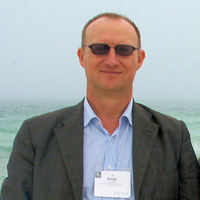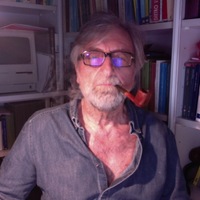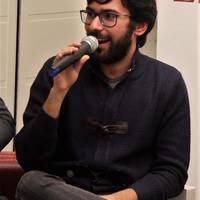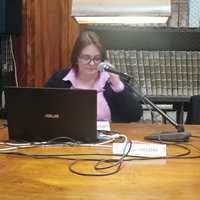
Serge Noiret
European University Institute, Dept of History and Civilization, Visiting fellow (Ph.D.) in the History Department (EUI)
Serge Noiret, (Born in Brussels, Belgium, on 31 of March 1957).
I was an information specialist and a visiting fellow in the history department of the EUI (European University Institute). I worked as a History Information Specialist (Fachreferent in German or Subject Specialist in English) at the EUI’s Library in Florence, Italy, to sustain the research activities of the History & Civilization Department (1985-2022).
I got my PH.D. in history in 1985 at the European University Institute and the equivalent Belgian title of Docteur en Philosophie et Lettres that same year.
I speak and write in French, Italian, and English.
I published widely on the crisis of the Italian liberal state, the history of political parties, electoral systems, and electoral campaigns, and digital (public) history. (See here: https://dph.hypotheses.org/publications/publications-related-to-pol-hist )
I taught "Comparative History of Electoral Systems in Europe" at the University of Urbino in Italy and “Digital History and Information Literacy” at the University of Naples and the EUI. I participated in and organized many international conferences in Italy, Europe, and elsewhere.
My research activities focus on the History of Public History and digital (Public) History. A list of publications in this field is available in my blog, Digital & Public History, here: https://dph.hypotheses.org/publications.
I am a member of the editorial boards of Memoria e Ricerca, Ricerche Storiche, Il Capitale Culturale. Studies on the value of cultural heritage; I was a member of scientific committees of the Réseau national des Maison des Sciences de l’Homme at the EHESS in Paris until December 2022; I am a member of the scientific committee of the Campus Condorcet in Aubervilliers; I was a member of the Board of Directors of the SISF, (Italian Society for the Study of Photography) and of the Florence International documentary film festival, "Festival dei Popoli".
I joined the US National Coalition for Public History (NCPH) in 2010 to foster the field's internationalization. From 2010 to 2012, I co-founded the International Federation for Public History (IFPH-FIHP) and became its first elected President (2012-2018). In 2016-2017, I co-founded the Italian Association of Public History (AIPH), of which I was President (2017-2024).
Today, my interests include (International) Public History, Digital Humanities, Digital History, Digital Public History, Open Access, Digital Photography, Digital Primary Sources, Memory Studies, Visual Culture, Cultural Heritage and Museums, and the Hermeneutics of Web content.
I was an information specialist and a visiting fellow in the history department of the EUI (European University Institute). I worked as a History Information Specialist (Fachreferent in German or Subject Specialist in English) at the EUI’s Library in Florence, Italy, to sustain the research activities of the History & Civilization Department (1985-2022).
I got my PH.D. in history in 1985 at the European University Institute and the equivalent Belgian title of Docteur en Philosophie et Lettres that same year.
I speak and write in French, Italian, and English.
I published widely on the crisis of the Italian liberal state, the history of political parties, electoral systems, and electoral campaigns, and digital (public) history. (See here: https://dph.hypotheses.org/publications/publications-related-to-pol-hist )
I taught "Comparative History of Electoral Systems in Europe" at the University of Urbino in Italy and “Digital History and Information Literacy” at the University of Naples and the EUI. I participated in and organized many international conferences in Italy, Europe, and elsewhere.
My research activities focus on the History of Public History and digital (Public) History. A list of publications in this field is available in my blog, Digital & Public History, here: https://dph.hypotheses.org/publications.
I am a member of the editorial boards of Memoria e Ricerca, Ricerche Storiche, Il Capitale Culturale. Studies on the value of cultural heritage; I was a member of scientific committees of the Réseau national des Maison des Sciences de l’Homme at the EHESS in Paris until December 2022; I am a member of the scientific committee of the Campus Condorcet in Aubervilliers; I was a member of the Board of Directors of the SISF, (Italian Society for the Study of Photography) and of the Florence International documentary film festival, "Festival dei Popoli".
I joined the US National Coalition for Public History (NCPH) in 2010 to foster the field's internationalization. From 2010 to 2012, I co-founded the International Federation for Public History (IFPH-FIHP) and became its first elected President (2012-2018). In 2016-2017, I co-founded the Italian Association of Public History (AIPH), of which I was President (2017-2024).
Today, my interests include (International) Public History, Digital Humanities, Digital History, Digital Public History, Open Access, Digital Photography, Digital Primary Sources, Memory Studies, Visual Culture, Cultural Heritage and Museums, and the Hermeneutics of Web content.
less
Related Authors
Paolo Favilli
University of Genova
Valeria Galimi
Università degli Studi di Firenze (University of Florence)
gianfranco bandini
Università degli Studi di Firenze (University of Florence)
Michele Lacriola
University of Siena / Università di Siena
Lorena Vallieri
Università degli Studi di Firenze (University of Florence)
Sheyla Moroni
Università degli Studi di Firenze (University of Florence)
Simona Inserra
Università di Catania
InterestsView All (31)









Uploads
Papers by Serge Noiret
Digital History in its interactive version 2.0, has certainly helped to open up “high culture”. But with the advent of web 2.0, history and memory are now the prerogative of anyone using “crowdsourcing” activities. The danger today is that specialists will not control anymore how digital history will show us the past. Without acknowledging that new instruments are transforming the historian’s craft, and without reflecting on the terms of these transformations, the digital revolution will eliminate the historians professional capacity to reconstruct the past. History will soon become an open territory for everybody to play with. This blog would like to reflect and inform about the most significant mutations that a Digital Public history way to Public History is offering: new forms of history practices -that professional historians should use to deepen the origins and identity claims by many communities tracing their own history in our globalized societies- should be better looked at.
This session aims to explain basic copyright concepts and set the table of copyright issues that challenge researchers, archivists & librarians: access and use of material from libraries, archives, and the web; different national copyright rules as sources of confusion (lack of harmonisation at the EU level); exceptions for educational use of materials & limitations and exceptions for libraries and archives (special focus to Italy); copyright of own publications.
The aim is also to gather practical experiences of researchers and/or professionals and start a Q&A which can determine the focus of future sessions.
In questo intervento, intendo guardare alla storia di RS per capire quali fossero questi segnali specifici di interesse per alcune forme di PH. L’arco di vita di RS è lungo e accompagna numerose trasformazioni della storia della storiografia italiana ed internazionale. Proprio alcuni spiccati interessi della rivista, sfociati in saggi e interventi anche come risultato di conferenze ed attività pubbliche, possono senz’altro essere assegnate alla PH. Il mio intervento si strutturerà dunque in questo modo. In primo luogo, parlerò brevemente di quello che oggi è lecito chiamare PH, un’indagine necessaria per capire in che modo e quando RS entra nel campo della PH. Nella seconda parte guarderò a come le preoccupazioni e metodi tipici della PH sono entrati a far parte dei temi di RS in quattro diversi capitoli dedicati, il primo, al patrimonio industriale e allo sviluppo dell’archeologia pubblica; il secondo alla vicinanza ai territori e alle comunità dell’alta Maremma toscana, il terzo, l’interdisciplinarietà della storia locale, e, infine, il quarto capitolo riguarderà RS dopo il 2009 e fino ad oggi, quando la PH diventò parte integrante delle tematiche che, nel mondo variegato della storiografia italiana, ormai caratterizzano, agli occhi di altre riviste e della comunità degli storici, la produzione scientifica della rivista.
El objetivo de este artículo es analizar cómo la historia pública digital y el contenido generado por los usuarios están estableciendo nuevas formas de actividad profesional en las redes sociales. Definiremos qué son las redes sociales, cómo contribuyen a las nuevas formas digitales de comunicación histórica y cómo los usuarios comparten datos sobre el pasado en plataformas en red. La segunda parte versa sobre el modo en que las redes sociales ayudan al oficio de los historiadores públicos digitales. Por último, se describe el tratamiento que ha recibido la conmemoración del centenario de la Primera Guerra Mundial en Twitter y el uso de las fotografías digitales o digitalizadas que circulan en las redes sociales.
Abstract:
The aim of this article is to examine how digital public history and user-generated content establish new sorts of professional activity within social networks. The first part of the essay defines social networking, and explores how it contributes to new digital forms of historical communication, and how users exchange data about the past in networked platforms. The second part looks at how social networks promote the craft of digital public historians. The last section describes the way commemorations of the centenary of WWI were depicted on Twitter and examines how digital or digitized photographs circulate in social media.
Si tiene il 17 marzo alle ore 18 il secondo appuntamento dal titolo Archivi e Memoria. Gli archivi audiovisivi e fotografici per la storia. L’incontro sarà dedicato alla discussione di progetti e iniziative che rimettono in circolazione in modo critico e creativo i materiali e le competenze custodite negli archivi. Si discuterà di archiviazione ma anche di mostre, progetti per la scuola e per il territorio, documentari e piattaforme digitali.
Alla conversazione del 17 marzo, moderata da Serge Noiret (European University Institute presidente AIPH), partecipano i rappresentanti di tre istituzioni:
* Monika Ruga e Andrea Scappa - Archivio LUCE
* Paolo Simoni - Home Movies - Archivio Nazionale del film di famiglia
* Stefano Perulli - Ente Regionale per il Patrimonio culturale - Friuli Venezia Giulia